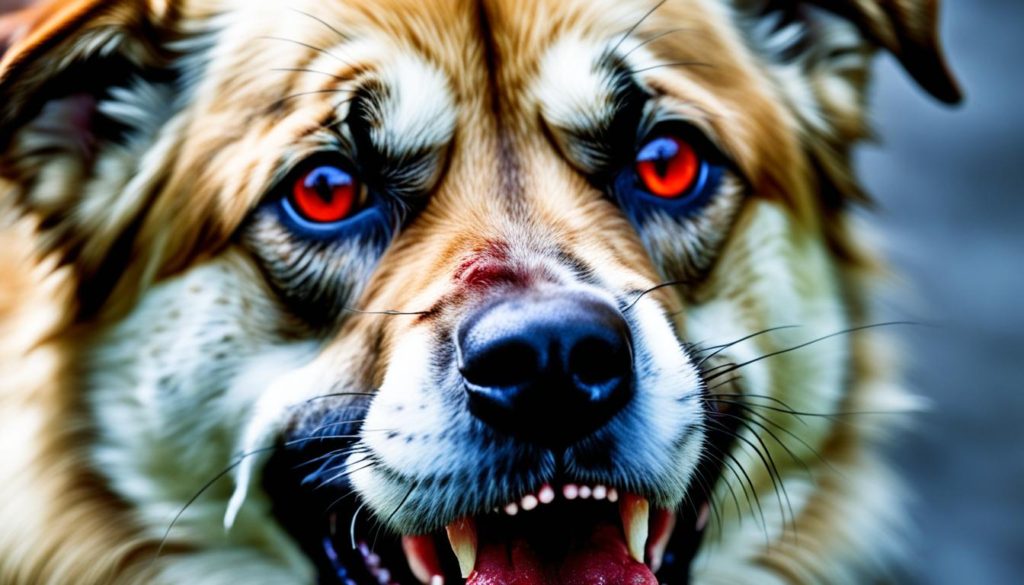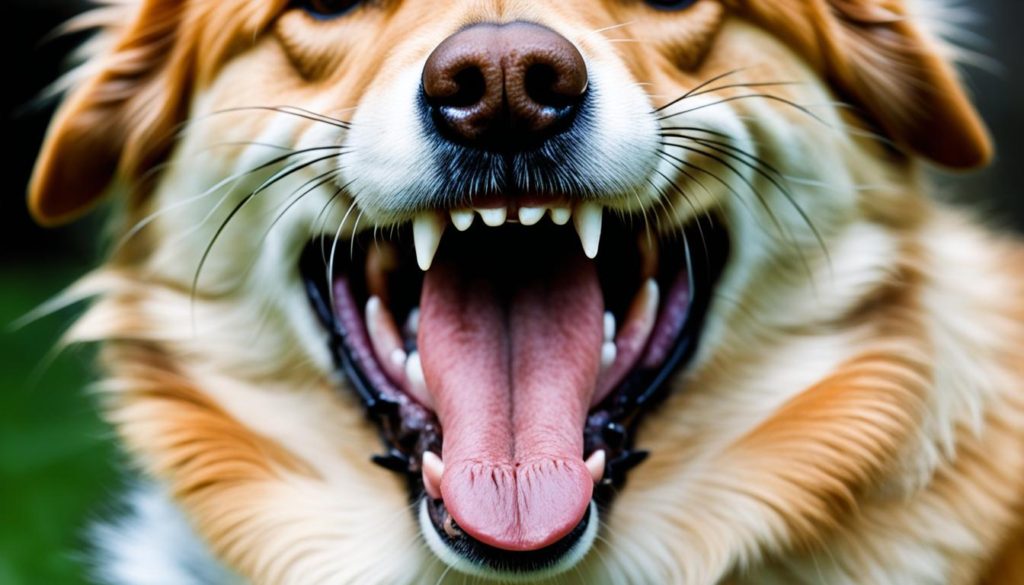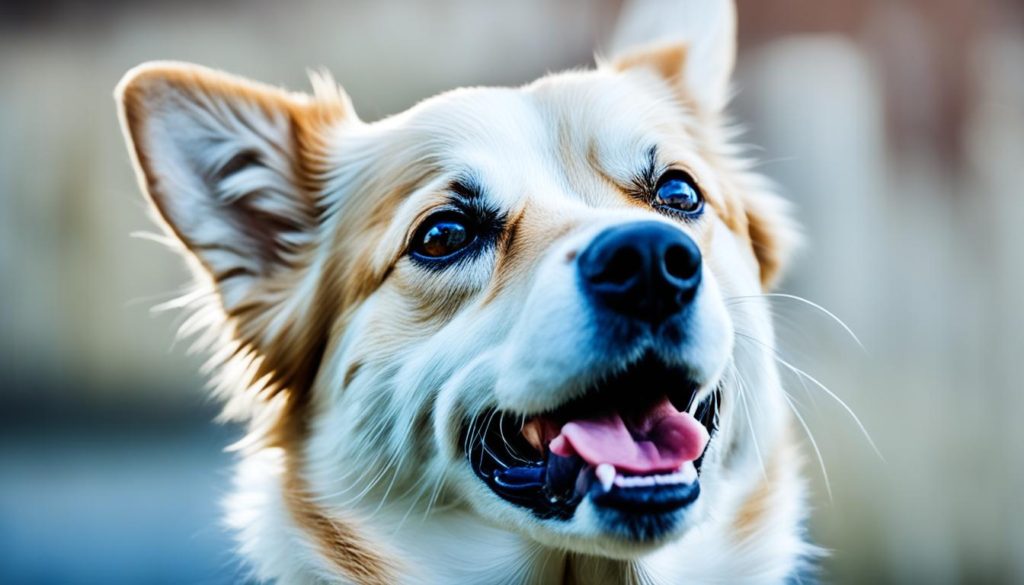In some cases, your beloved furry friend may start foaming at the mouth, causing concern as a pet owner. While it may not always be a cause for alarm, excessive drooling and foaming in dogs can be a sign of underlying health issues that require immediate attention. This article will explore the different causes of dog foaming at the mouth and provide guidance on when to seek help for your dog’s health concerns.
Key Takeaways:
- Dog foaming at the mouth can have various causes, ranging from benign conditions to serious health concerns.
- Benign causes include teething in puppies and certain medications that dogs may find distasteful.
- Serious causes include rabies, toxin ingestion, objects stuck in the dog’s mouth, dental disease, motion sickness, and gastrointestinal issues.
- Recognizing the specific symptoms associated with these serious causes is crucial in determining the underlying condition.
- If you notice excessive foaming at the mouth, especially accompanied by other concerning symptoms, it is crucial to seek veterinary help.
Benign Causes of Dog Foaming at the Mouth
Not all instances of dog foaming at the mouth are indicative of a serious health problem. In puppies, teething can lead to increased drooling, which may cause foaming. Additionally, certain medications, both for dogs and humans, can cause dogs to foam at the mouth if they don’t like the taste. These benign causes should be considered before assuming a more severe condition.
If you have a puppy that is foaming at the mouth, it’s important to note that teething can cause increased drooling due to the soreness and discomfort in their gums. This excessive drooling may create a foamy appearance around their mouth, but it is typically harmless. As your puppy grows older and their adult teeth come in, the excessive drooling should subside.
Another benign cause of foaming at the mouth in dogs is the administration of certain medications. Dogs, like humans, can have preferences when it comes to the taste of medications. If your dog doesn’t like the taste of a medication, they may exhibit foaming around their mouth as a reflex. This is a temporary reaction and will usually subside once the medication is administered.
It’s important to note that while these benign causes are relatively harmless, if your dog is experiencing other concerning symptoms alongside the foaming at the mouth, it’s always best to consult with a veterinarian to rule out any underlying health issues.
| Benign Causes of Dog Foaming at the Mouth | Symptoms |
|---|---|
| Teething in puppies | Excessive drooling, sore gums |
| Medications | Dislike of medication taste |
Serious Causes of Dog Foaming at the Mouth
When your dog starts foaming at the mouth, it can be a sign of a more serious underlying health issue. It’s important to be aware of the potential causes that require immediate veterinary attention. Here are the most common serious causes of dog foaming at the mouth:
Rabies in Dogs
Rabies is a viral infection that affects the central nervous system of dogs and other mammals. One of the classic symptoms of rabies is excessive drooling and foaming at the mouth. It is crucial to seek immediate veterinary care if you suspect your dog has been exposed to rabies.
Ingestion of Toxins
Dogs can accidentally ingest various toxins, such as certain plants, chemicals, or medications. These toxins can irritate the dog’s mouth and trigger foaming. If you suspect your dog has ingested a toxic substance, contact your veterinarian for guidance.
Physical Objects in Dog’s Mouth Causing Foaming
Objects, such as sticks, bones, or foreign bodies, can get stuck in your dog’s mouth, causing irritation and excessive drooling. This, in turn, can lead to foaming. If you notice your dog pawing at its mouth or struggling to remove something, consult your veterinarian immediately.
Dental Disease in Dogs
Poor dental health can contribute to foaming at the mouth in dogs. Dental issues like gum disease, dental abscesses, or oral infections can cause pain and discomfort, leading to excessive drooling and foaming. Regular dental check-ups and proper oral hygiene are essential for preventing and managing dental disease.
Motion Sickness in Dogs
Just like humans, dogs can experience motion sickness when traveling in a car, boat, or plane. Motion sickness can cause anxiety and nausea, resulting in excessive drooling and foaming. Your veterinarian can provide solutions to help alleviate motion sickness and make travel more comfortable for your dog.
Gastrointestinal Issues in Dogs
Gastrointestinal problems, such as stomach upset, gastritis, or intestinal blockages, can also cause foaming at the mouth in dogs. These issues are often accompanied by symptoms like vomiting, diarrhea, or abdominal pain. If your dog displays these signs along with foaming, consult your veterinarian for a proper diagnosis and treatment plan.
It’s important to remember that each of these serious causes requires professional veterinary attention. Ignoring the symptoms can lead to worsening health conditions and complications for your beloved pet. Therefore, if you notice your dog foaming at the mouth and suspect any of these serious causes, seek immediate veterinary care to ensure the well-being of your furry friend.

Recognizing the Symptoms of Serious Causes
Each serious cause of dog foaming at the mouth is associated with specific symptoms. It’s important to be able to recognize these symptoms in order to determine the underlying cause and seek appropriate veterinary care for your beloved furry friend.
Symptoms of Rabies in Dogs
Rabies is a serious viral disease that affects the central nervous system. Some common symptoms of rabies in dogs include:
- Changes in behavior, such as aggression or unusual excitability
- Seizures
- Paralysis
Signs of Toxin Ingestion in Dogs
Dogs can accidentally ingest various substances that can be toxic to their system. Some signs of toxin ingestion in dogs include:
- Vomiting
- Diarrhea
- Weakness
- Loss of appetite
Dental Disease Symptoms in Dogs
Poor dental health can cause discomfort and lead to excessive drooling and foaming in dogs. Some dental disease symptoms to watch out for include:
- Bad breath
- Heavy tartar buildup
- Difficulty eating or chewing
Motion Sickness Symptoms in Dogs
Some dogs may experience motion sickness when traveling in cars or other modes of transportation. Symptoms of motion sickness in dogs include:
- Anxiety or restlessness
- Excessive panting
- Excessive drooling and foaming
Gastrointestinal Issues Symptoms in Dogs
Gastrointestinal problems can cause discomfort and lead to excessive drooling and foaming in dogs. Some symptoms of gastrointestinal issues in dogs include:
- Nausea
- Vomiting
- Diarrhea
- Loss of appetite
Recognizing these symptoms is crucial in determining the underlying cause of dog foaming at the mouth. If you observe any of these symptoms in your dog, it’s important to consult with a veterinarian for a proper diagnosis and appropriate treatment.
| Cause of Foaming at the Mouth | Symptoms |
|---|---|
| Rabies | Changes in behavior, seizures, paralysis |
| Toxin Ingestion | Vomiting, diarrhea, weakness, loss of appetite |
| Dental Disease | Bad breath, heavy tartar buildup, difficulty eating or chewing |
| Motion Sickness | Anxiety or restlessness, excessive panting, excessive drooling and foaming |
| Gastrointestinal Issues | Nausea, vomiting, diarrhea, loss of appetite |

Seeking Veterinary Help for Dog Foaming at the Mouth
If you notice your dog foaming at the mouth, especially if accompanied by other concerning symptoms, it is important to seek veterinary help promptly. Excessive foaming can be a sign of underlying health issues that require professional attention. Early diagnosis and treatment can greatly improve the prognosis for your dog’s health.
When to Seek Veterinary Help
There are certain situations where you should immediately reach out to your veterinarian:
- If your dog is experiencing severe foaming at the mouth that persists for an extended period
- If your dog shows signs of distress, such as difficulty breathing or excessive drooling
- If your dog has been exposed to potential toxins or ingested something harmful
- If your dog’s behavior has changed or they appear lethargic
- If your dog has been in contact with animals that may carry diseases, such as rabies
It’s always better to err on the side of caution and seek veterinary help if you have any concerns about your dog’s health.
Emergency Vet Care
In some cases, foaming at the mouth may indicate a medical emergency that requires immediate attention. If your dog exhibits severe symptoms, such as seizures, collapse, or difficulty breathing, it is crucial to contact your nearest emergency veterinarian as soon as possible. They have the expertise and resources to provide the necessary urgent care for your dog.
Treatment Options
The treatment options for dog foaming at the mouth will depend on the underlying cause. Upon examining your dog, the veterinarian may perform tests to determine the specific reason behind the foaming. Treatment can range from medication administration to surgery, depending on the diagnosis.
Here is a brief overview of potential treatment options:
| Underlying Cause | Treatment |
|---|---|
| Rabies | Vaccination and supportive care |
| Toxin ingestion | Administration of antidotes or supportive care to eliminate toxins |
| Dental disease | Professional dental cleaning, tooth extraction if necessary, and oral hygiene maintenance |
| Motion sickness | Medications to manage symptoms and desensitization training |
| Gastrointestinal issues | Medications, dietary changes, and management of the underlying condition |
It is important to follow your veterinarian’s instructions for post-treatment care and any necessary follow-up appointments to ensure your dog’s full recovery.
Preventative Measures for Dog Foaming at the Mouth
While some causes of dog foaming at the mouth may be inevitable, there are preventive measures that can be taken to reduce the risk. By implementing these strategies, you can help maintain your dog’s overall health and minimize the occurrence of excessive drooling and foaming.
Maintaining Dental Health
Proper dental care is crucial in preventing oral health issues that can contribute to foaming at the mouth in dogs. Regular brushing with a dog-specific toothbrush and toothpaste, along with routine dental check-ups, can help maintain healthy gums and prevent dental diseases that may cause excessive drooling.
Managing Motion Sickness
If your dog experiences motion sickness, it can lead to anxiety and excessive panting, which may result in increased drooling and foaming at the mouth. Consult with your veterinarian to discuss options for managing motion sickness in your dog. This may include medications or desensitization training to help alleviate the symptoms.
Preventing Ingestion of Toxins
Ensuring your dog is not exposed to toxic substances is crucial in preventing foaming at the mouth. Pet-proof your home by securely storing household chemicals, medications, and foods that are toxic to dogs. Keep an eye out for potential hazards while taking your dog for walks or visiting unfamiliar environments.
Promoting Gastrointestinal Health
A balanced diet and regular veterinary check-ups are essential in promoting gastrointestinal health in dogs. Provide your dog with a nutritious diet that is appropriate for their age, breed, and specific dietary needs. Regular visits to the veterinarian can help detect and address any gastrointestinal issues before they worsen and lead to excessive drooling and foaming.
By following these preventative measures, you can provide the best possible care for your dog and reduce the occurrence of foaming at the mouth. Remember, if you have any concerns about your dog’s health or notice any unusual symptoms, it’s always best to consult with your veterinarian for guidance and appropriate treatment.
Conclusion
In summary, dog foaming at the mouth can have various causes, ranging from benign to serious health concerns. It is important for pet owners to be vigilant and monitor their dog’s symptoms closely. Excessive drooling and foaming should not be ignored, especially if accompanied by other concerning signs.
Prompt veterinary care is crucial in determining the underlying cause and providing appropriate treatment. Your veterinarian can perform a thorough examination, conduct diagnostic tests, and recommend a treatment plan tailored to your dog’s specific needs. Remember, early intervention can greatly improve the prognosis for your furry friend’s health.
Regular visits to the veterinarian for check-ups and preventive care are essential in maintaining your dog’s overall well-being. Preventive measures, such as maintaining good dental health, managing motion sickness, preventing ingestion of toxins, and promoting gastrointestinal health, can also help minimize the occurrence of excessive drooling and foaming.
Always remember, if you have any doubts or concerns about your dog’s health, consult with a veterinarian. They are the best resource to provide expert advice and ensure the health and happiness of your beloved companion.
FAQ
What are the benign causes of dog foaming at the mouth?
Benign causes of dog foaming at the mouth can include teething in puppies and the taste of certain medications.
What are the serious causes of dog foaming at the mouth?
Serious causes of dog foaming at the mouth can include rabies, ingestion of toxins, physical objects in the dog’s mouth, dental disease, motion sickness, and gastrointestinal issues.
What are the symptoms of serious causes of dog foaming at the mouth?
The symptoms of serious causes of dog foaming at the mouth can vary depending on the condition and may include changes in behavior, anger, seizures, paralysis, vomiting, bad breath, heavy tartar buildup, anxiety, excessive panting, nausea, and vomiting.
When should I seek veterinary help for dog foaming at the mouth?
If you notice excessive foaming at the mouth in your dog, especially if accompanied by other concerning symptoms, it is important to seek veterinary help.
What treatment options are available for dog foaming at the mouth?
The treatment options for dog foaming at the mouth will vary depending on the underlying cause. Early intervention can improve the prognosis for your dog’s health.
What preventative measures can I take to reduce the risk of dog foaming at the mouth?
Preventative measures include maintaining good dental health, managing motion sickness, preventing ingestion of toxins, and promoting gastrointestinal health through a balanced diet and regular vet check-ups.
What is the importance of veterinary care for dog foaming at the mouth?
Veterinary care is crucial in diagnosing and treating the underlying cause of dog foaming at the mouth. Prompt care can ensure the well-being of your furry friend.
